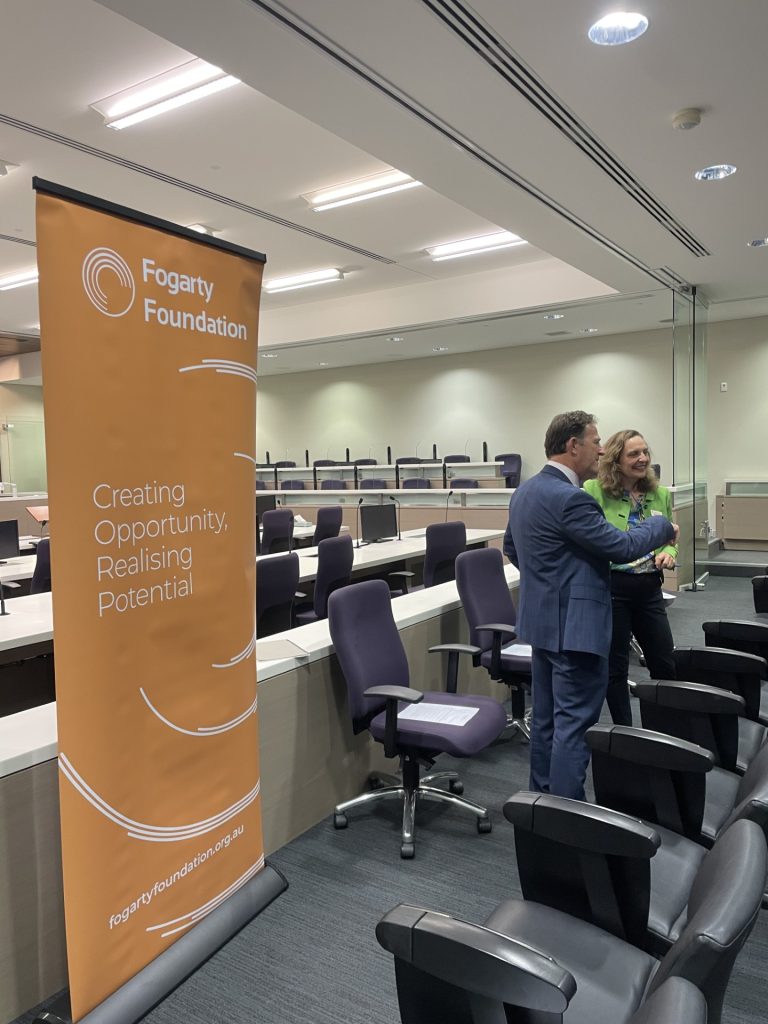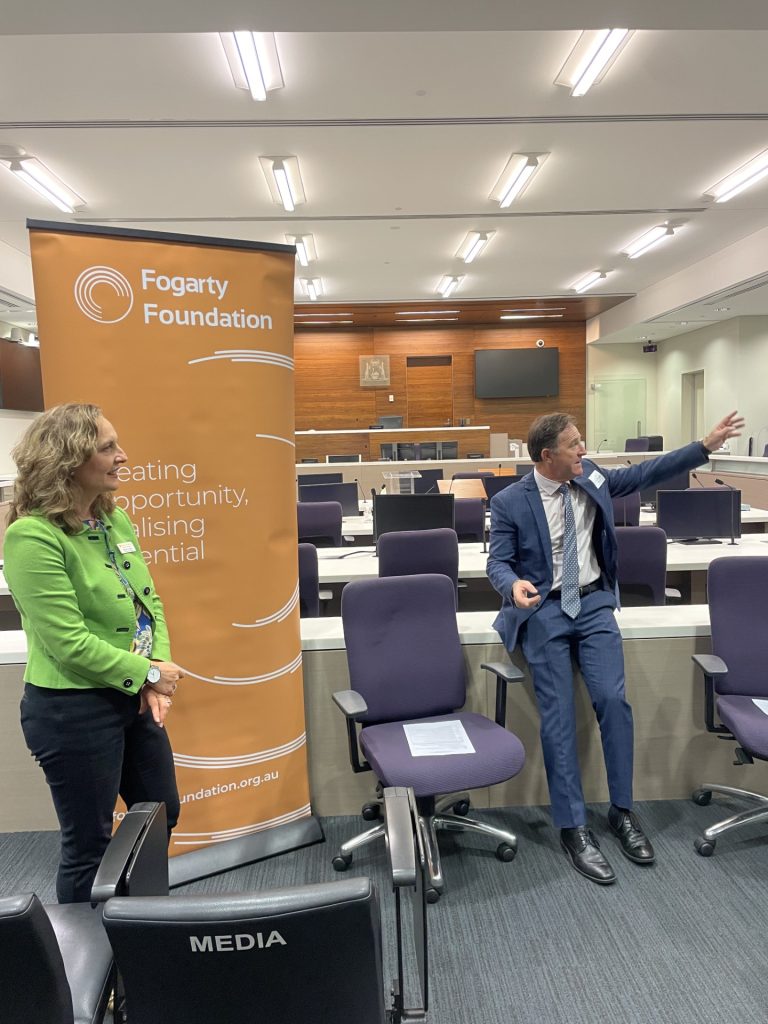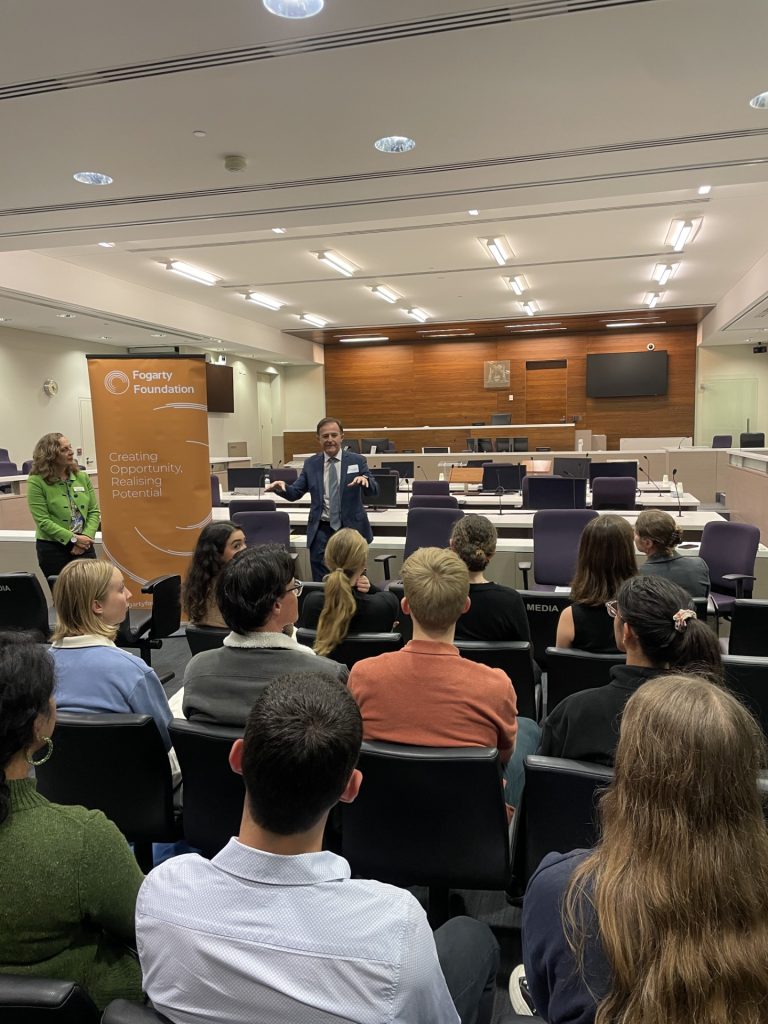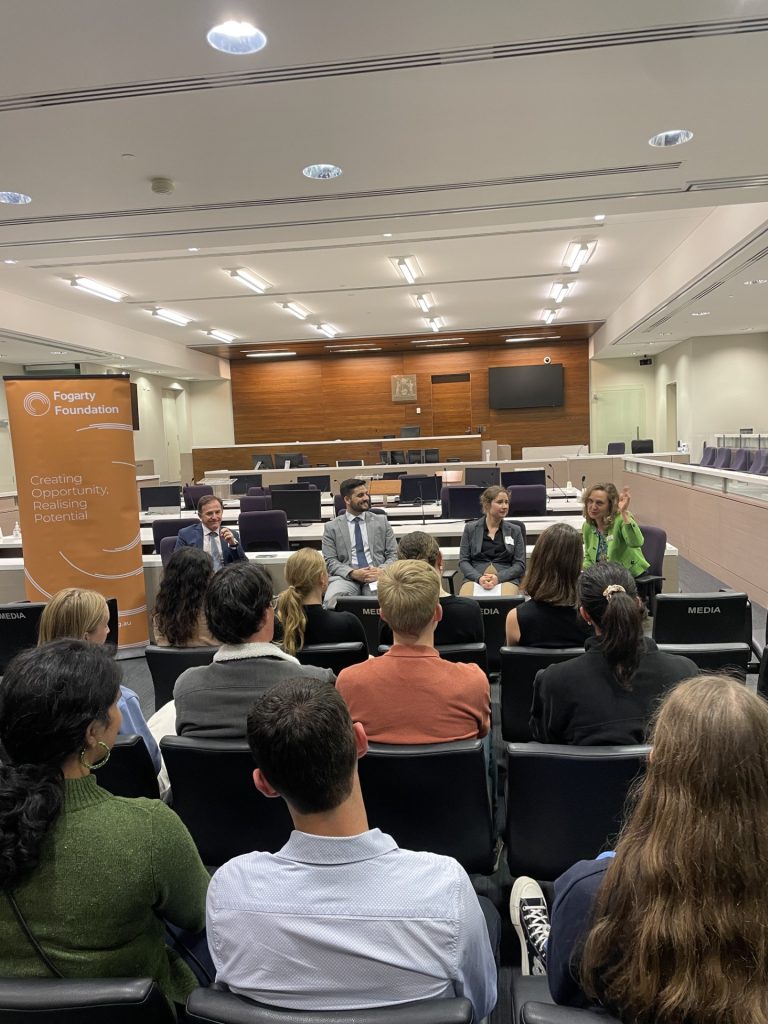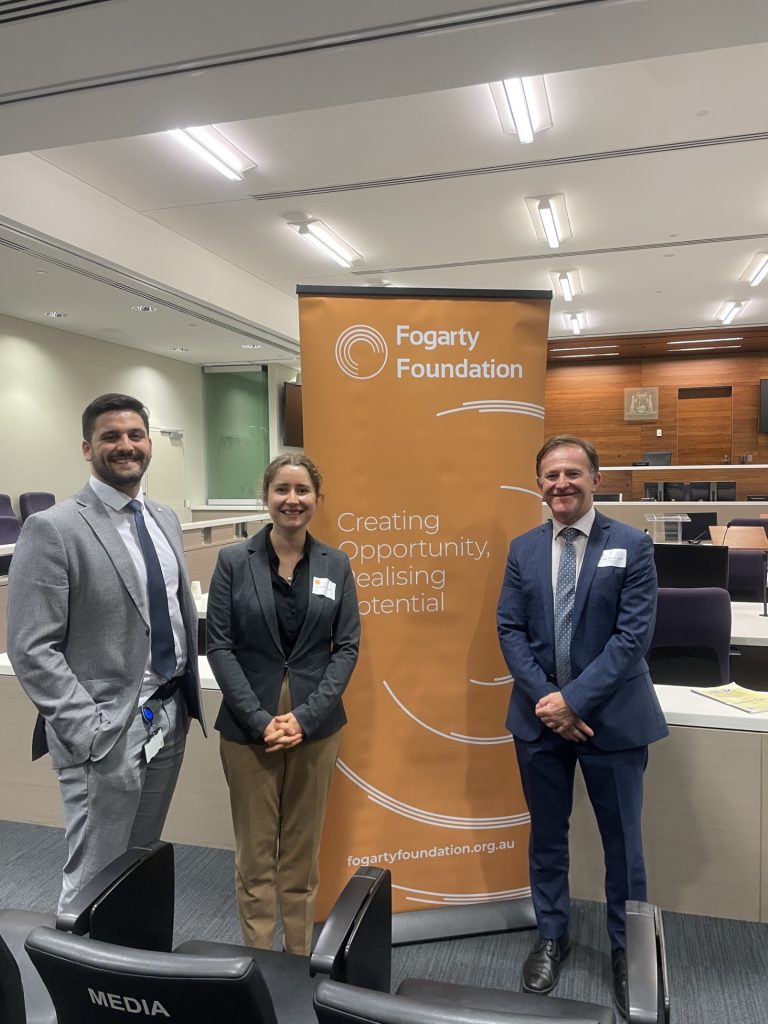From Passion to Pages: Rebecca Higgie’s Journey as the Inaugural Fogarty Literary Award Winner
Rebecca Higgie’s journey to literary recognition reflects the power of storytelling and the support of the literary community. From her academic roots to becoming the inaugural winner of the first Fogarty Literary Award with her book The History of Mischief, Higgie’s path has been shaped by a blend of scholarly inquiry, creative exploration, and a deep-seated passion for narrative.
Before delving into the world of fiction, Higgie’s academic pursuits at Curtin University and Brunel University London centered on satire and politics. These studies influenced her perspective as a novelist, enriching her storytelling with nuanced insights into societal dynamics and human behaviour. “As an academic, you always need to critique your research materials, and that is an attitude I have taken to my writing,” Higgie reflects modestly.
Higgie’s journey as a writer began early. “I wrote my first little book when I was five years old. It was a story about fairies that I stapled into a booklet and gave to my mother. She never told me that I’d misspelt the word ‘fairy’ on every page, only saying how much she loved it. From then on, I was a writer, penning my first full novel when I was nine (it was rubbish, but what good practice it was!).”
Despite early confidence in her youth, Higgie’s writing journey faced challenges. “As a young teen, I wrote six novels and a few novellas, but after struggling with Year 11 and 12, I almost gave up writing.” However, her passion for storytelling persisted. “At university, when I tried creative writing units, I never did as well as my cultural studies courses. It dented my confidence, but I couldn’t stop telling stories to myself. So, I wrote The History of Mischief, the Fogarty winning book, largely in secret.”
The novel took twelve years to finish, a period during which Higgie balanced her studies, career, and starting a family. A pivotal moment came when she found unwavering support from her husband, Yirga. “My husband Yirga was the first person to read part of The History of Mischief, and his encouragement is what spurred me to finish after so many years of doubt.”
Higgie’s novel The History of Mischief is a rich tapestry of magic, mischief, madness, and mystery. Inspired by her personal experiences and love for history, she explores themes of grief and loss through a magical narrative. “It all started when I turned eighteen and my parents changed their will so I would become the legal guardian of my younger siblings if they both died. I was fortunate that this never happened, but it made me wonder what it would be like to navigate my own grief while suddenly becoming a parental figure to my siblings. From this, the characters of Jessie and Kay were born.”
Higgie’s academic background has significantly shaped her approach to writing. “I feel the need to research everything, which enriches my writing but is also very time-consuming. Sometimes, I read multiple books, journal articles or reports to write just one sentence (that may end up being cut anyway). For me, though, this is necessary. It helps me ‘live’ or ‘feel’ my story through having a deeper understanding about what happened during a particular time period, how people felt at the time, or how certain things work.”
Reflecting on her journey, Higgie acknowledges the significant impact of winning the Fogarty Literary Award on her career. “Since I was largely writing in secret, winning the Fogarty instantly skyrocketed me into the WA literary community. Overnight, I was welcomed in, embraced like an old friend. I have made so many connections that still buoy me today.”
Higgie’s advice to aspiring writers is to embrace their unique voice and persist despite doubts. “Feel the doubt and write anyway. Don’t write the book you think publishers want; write the book that burns inside you.”
She also emphasises the importance of initiatives like the Fogarty Literary Award in fostering a supportive environment for emerging writers. “The value of this award is that it not only gives you recognition, but it also says, ‘yes, the stories of young people are important!'”
For those curious about her literary tastes, Higgie recommends, “Three books that have resonated deeply with me are Humanity’s Moment by Joelle Gergis, Smart Ovens for Lonely People by Elizabeth Tan, and The Shadow of the Wind by Carlos Ruiz Zafon. Each offers a unique perspective and a masterful blend of storytelling that continues to inspire my own writing.”
Looking ahead, Higgie is working on her second novel, a work of adult historical and speculative fiction, and continues to engage with the literary community through workshops and festivals. Rebecca’s journey from passion to pages will hopefully inspire emerging writers and enrich the Australian literary landscape.
You can see more about her debut book here or learn more about the Fogarty Literary Award!
Our prestigious UWA Fogarty Scholarship has been distinguished as one of the top 12 most lucrative scholarships available to Year 12 students across Australia. It was recently ranked by The Art of Smart at number 8 in Australia.
The Art of Smart is an educational organisation known for providing tutoring services and offering career and leadership mentoring to students. It focuses on empowering students to achieve academic success and develop important life skills for their future endeavors.
The Foundation is pleased to be named in these rankings as we take a holistic approach toward our Scholarships; ensuring students have a range of mentoring opportunities, leadership development events and cohort building opportunities.
Established to nurture the brightest minds and future leaders, the UWA Fogarty Scholarship offers not only financial support but also a platform for personal and professional growth. Recipients benefit from comprehensive financial assistance throughout their undergraduate (and postgraduate) studies at UWA, alongside invaluable mentoring and networking opportunities. Each year, a select number of exceptional students are awarded the UWA Fogarty Scholarship, reaching a milestone in their educational journey and opening doors to a world of opportunities.
Empowering Future Scientists Through Hands-On STEM Education
The Foundation is committed to fostering STEM education and career exploration, including in medical research and especially for those students who may miss out on enrichment opportunities. It also strives to raise educational aspirations.
That’s why, in the July 2024 West Australian school holidays, we supported 16 students from low socio-economic index (SEI) schools to attend the Perkins Profs Intensive Program School Holiday Program at the Harry Perkins Institute of Medical Research in Nedlands.
This partnership, now in its 8th year, provides an opportunity for students to immerse themselves in a STEM environment, offering real-life lab contexts that extend beyond the traditional classroom setting. Throughout the week-long program, participants engaged in hands-on medical research techniques and had the unique chance to interact with researchers, bioengineers, and science undergraduates. These interactions provided students with insights into various study pathways and potential career options in medical research.
The Program’s curriculum is designed to bridge the gap between theoretical knowledge and practical application. Students participated in a series of specially designed activities that not only enhanced their understanding of medical research but also ignited their passion for STEM. From conducting experiments in state-of-the-art laboratories to attending seminars led by seasoned researchers, the Program ensured that students gained a comprehensive understanding of what a career in medical research entails.
‘’I got to see people who have careers in medical science and get to know their experience, it made me more aware of what is required, so I want to make sure I study to get a high ATAR and have a career in medicine.’’
The ongoing Perkins Profs Intensive Program highlights the power of collaboration between educational institutions and research organisations. By providing students access to less conventional experiences, in partnership with the Foundation, the Program is helping to level the playing field and create opportunities for all students, regardless of their socio-economic background.
More from the Harry Perkins Institute of Medical Research!
UWA Fogarty Scholar and John Monash Scholars alum in conversation with South Australian Governor Frances Adamson AC
Tom Williams, a UWA Fogarty Scholar alum from the 2008 cohort and a Woodside John Monash Scholar from the 2015 cohort, leveraged his experience and work in China to interview Her Excellency the Hon Frances Adamson AC, Governor of South Australia. This interview was part of the John Monash Foundation’s Leadership Series.
The interview highlighted a collection of leadership insights, summarised below.
1. Understand people in their whole context. If you remember names, who and what matters to whom, and how each individual interacts with the world, you can better encourage others to feel a part of something larger and empowered to participate in making it grow.
2. Give trust to gain trust. Do so as early as possible. Communicate to others what your standards and expectations are, and that beyond this you will trust them to go about their pursuits in the best way they see fit. Let specialists be specialists and practice their expertise. Still, pay attention to everything that is going on within a group, and ensure that the open environment is not being taken advantage of by bad actors. A well-protected culture of trust brings fulfilment and better results.
3. Be as collaborative as possible. Life is long, and you will never know when you will see and work with others again. Focus on the positive aspects of relationships. Emphasise ways in which individuals can work together in the long run. In this way, you can foster understanding and cohesion in the moment and at unexpected crossroads in the future.
4. Communicate impartiality and demonstrate that the decisions you make are part of a larger context. This helps de-personalise conflict, gives everyone a sense of proportion, and clears space for information sharing and idea exploration. This also extends to seeking sources of knowledge and innovation. Status doesn’t matter when it comes to expertise and creativity; good ideas and best practices must be sought out everywhere.
5. Change with change. When not in a crisis, constantly seek feedback and input from all parts of an organisation. When in a crisis, take a firm hand to the tiller and set the direction until the storm subsides.
6. Chip away over decades at a few particular skills, in a context that values those skills, and in which they can be deployed. A steady focus applied to the next best move on a day is a flywheel that delivers compounding results each year.
7. When you are at work, be there. When you are at home, be there. Be where you are and if you feel you need to apologise for it, that’s a sign you are probably not in the right place.
8. Finally, give glory to others. When something is achieved, make sure everyone stands in the limelight.
Reproduced with permission of the John Monash Foundation, which provides Scholarships to postgraduate to support outstanding Australians to undertake studies anywhere in the world. The Scholarship’s purpose is to foster Australian leadership, expertise and international networks for the long-term benefit of the country. The John Monash Scholarship is emblematic of our country’s academic talent, diversity and leadership excellence.
Learn more about the John Monash Scholarship here!
The Fogarty Foundation is excited to announce it is partnering with the GoSHackathon event to support the expansion of its initiatives into two more regions of WA. This collaboration is a milestone in advancing innovation opportunities for regional young people, fostering youth engagement, and promoting future skill building initiatives.
Our strategic partnership with GoSH reflects our commitment to supporting educational aspirations, entrepreneurship, and community empowerment.
The vision of the GoSHackathon is to highlight a multitude of pathways for future careers, and to see regional youth recognised as innovative disruptors in the technology field. Its mission is to inspire greatness across WA’s regions, bring industry and opportunity, and empower young people through disruption, showcasing their unique skill sets and creativity.
The event was first run in 2023 in the Peel region and is the brainchild of Michelle Wong, who also runs the Mandurah CoderDojo for neurodivergent adolescents. In 2023, the event combined a single-day showcase for young people followed by a hackathon, which together attracted 700 participants from 13 schools in the region.
Given its success, GoSH is now a staple event for young people in the Peel region, running again in August 2024. The success of GoSH has become a catalyst for several other regional areas requesting similar events in their communities. This has led to negotiations with representatives from Geraldton and the South-West, with a view to holding a GoSHackathon in the South-West in 2024 and another in Geraldton in the first half of 2025. Additionally, opportunities are emerging in the Kimberley, and Albany has also expressed interest.
Through these events and the wider GoSH network, we seek to inspire educators, enabling them to support their students’ innovative spark – and capabilities – more effectively. This partnership will amplify the project’s impact, fostering innovation, and unlocking opportunities for young talent, regardless of socio-economic or geographical barriers. By supporting this initiative, the Foundation aims to encourage innovation and empower young people in regional areas.
In the evolving landscape of space exploration, opportunities for hands-on learning and insight are invaluable. Recently, Caleb Adams, a UWA Fogarty Scholar, had the opportunity to participate in the Milo Mission Academy for Luna Exploration. Sponsored by AROSE, this Academy is designed for college, university, and early career participants from Australia and New Zealand. It is a 12-week STEM workforce development program offered virtually, enabling geographically diverse students to fully participate, regardless of their location.
Led by Arizona State University’s (ASU) School of Earth and Space Exploration, the Milo Mission Academy offers a unique platform for aspiring space enthusiasts to delve into the dynamic realm of space science. The academy provides participants with a hands-on, deep-dive understanding of the space mission life cycle. This team-based experience helps participants gain knowledge about the needs of the space sector and learn the practices, protocols, and procedures required to operate within a space environment. The skills gained through this academy are foundational workforce skills transferable across many Earth-based sectors, including Energy, Resources, Defence, Communications/Tech, and Advanced Manufacturing.
In a recent interview, Caleb shared his thoughts, “Participating in the Milo Mission Academy was a transformative experience. It provided me with practical insights into the complexities of space exploration, something that’s hard to come by through traditional coursework alone.”
Reflecting on his 12-week participation in the project, Caleb emphasised the hands-on learning approach offered by ASU’s School of Earth and Space Exploration. “The Milo Mission Academy provides a remarkable opportunity to gain practical insights into the complexities of space exploration,” Caleb stated. “The course is designed to be accessible to everyone, with a hands-on approach that truly sets this program apart.”
When asked about the highlights of the experience, Caleb spoke passionately about the depth of knowledge he acquired during the program. “One of the most remarkable aspects was the opportunity to work on real-world projects. For instance, we developed a comprehensive high-quality NASA-style document for an upcoming mission. This project allowed us to apply our engineering, teamwork, and leadership skills in a practical setting.” Another of these real-world projects Caleb participated in was the Mission Concept Review (MCR). ‘It was incredibly rewarding to see our ideas take shape and understand how they could fit into the space exploration ecosystem,” Caleb shared.
The most significant piece of knowledge Caleb acquired during the Academy was the importance of systems thinking in space missions. “Understanding how different components of a mission interact and depend on each other was incredibly insightful. This high-level view is essential for the successful planning and execution of space projects,” he explained.
The Milo Mission Academy is structured to offer a blend of online lectures, interactive sessions, and collaborative projects. Lectures are delivered by leading experts in space science and technology, providing a comprehensive curriculum that covers both theoretical and practical aspects of space exploration. Caleb noted, “One of the highlights of the Academy is the total immersion in creating NASA-style deliverables with the support of industry leaders and group mentors to guide the experience.” Caleb also appreciated this collaborative and flexible nature of the Academy, emphasising the perspectives brought by presenters from diverse fields. “Being part of a community of like-minded individuals, all driven by a shared passion for space exploration, was truly inspiring,” he noted. “The discussions and exchanges of ideas fostered a dynamic learning environment that encouraged innovation and collaboration’’. Moreover, working solely online taught Caleb how to operate effectively with others even without face-to-face contact. “I enjoyed how this online environment blended independent working with collaboration to deliver high-quality deliverables throughout the Academy,” he said.
The use of this highly interactive and project-based approach is designed to enhance participants’ understanding of space exploration. Caleb elaborated, “We worked on long-term projects at the same time as completing smaller skill modules and watching theory-based live lectures. I particularly valued working on these longer deliverables, with smaller bite-sized online learning modules dispersed throughout the Academy to provide a comprehensive theoretical and practical knowledge of how the space industry works.”
When asked what advice he would give to someone considering joining the Milo Mission Academy, Caleb was enthusiastic. “My advice to someone considering joining the MILO Mission Academy is to fully embrace the opportunity. Be prepared to engage deeply with the learning material provided, collaborate with your peers, and take initiative in your learning. This program is a unique chance to gain hands-on experience and make meaningful connections in the field of space science. I would encourage anyone curious about the space sector to apply for the Academy.’’
Looking ahead, Caleb expressed his gratitude for the opportunity to participate in the Milo Mission Academy and his excitement for the future of space exploration. “The knowledge and skills I gained from this experience will undoubtedly shape my journey in the field of space science,” he said. Participating in the MILO Mission Academy has solidified Caleb’s ambition to work in the space sector. “I am eager to apply what I’ve learned and contribute to the ongoing efforts to explore and understand our universe.” It has inspired him to focus on the development of technologies that can make a significant impact on sustainability and national security.
“The experience has also reinforced my commitment to contribute to space policy discussions and advocate for the advancement of the aerospace industry and space sector in Australia,” Caleb added.
Caleb envisions applying what he has learned to advance the integration of near-space and unmanned aerial systems into Australia’s response to climate change and national security discussions. “These technologies have already proven their economic benefits in other parts of the world, and I aim to bring these advantages to Australia. By contributing to the development and implementation of these systems, I hope to enhance the sustainability and prosperity of our community, ultimately making a lasting impact on the future of space exploration,” he stated.
The Fogarty Foundation is excited by advancements taking place in Australia’s space sector. Initiatives like the Milo Mission Academy serve as a vital link, facilitating the transition of tertiary students and early-stage career professionals who are aspiring to pursue careers or research projects in space-related fields. Engaging in exploration and broader interaction with the galaxy holds promise for benefiting all on Earth.
The Milo Mission Academy is delivered exclusively in Australia and NZ by AROSE and offered annually at the start of a calendar year. To learn more, visit AROSE here.
Empowering Schools: Fogarty EDvance in 2024
As the year progresses, the Fogarty Foundation is pleased to share an update on Fogarty EDvance, a program established by the Foundation in 2012 to support schools in challenging communities. To date, EDvance has worked with 148 schools and over 500 school leaders across 11 cohorts and are preparing to recruit its 12th cohort. The program, now delivered by Knowledge Society, sees a pathway to educational equity in WA to significantly improve student outcomes for students.
In 2024, Fogarty EDvance continues to empower educators through utilising evidence-based content to improve the capabilities of school leadership teams. This commitment is crucial due to the ongoing educational divide in low socio-economic communities. In addition to the core three-year program, EDvance continues to offer valuable additional components including the Middle Leaders Program, the Instructional Adviser Model and the annual EDvance Teaching Intensives.
The seventh cohort of EDvance schools successfully completed the program in 2022. These Cohort 7 schools experienced a challenging three years of delivering education, with several phases of the COVID-19 pandemic resulting in disruption to learning, staffing and wellbeing. Their resilience and commitment to student growth needs to be acknowledged. The recently released Cohort 7 Impact Report highlights the effectiveness of these schools in challenging circumstances and showcases a positive impact on school leadership and educational outcomes.
As 2024 progresses, Fogarty EDvance remains dedicated to driving improvements in the Western Australian educational landscape, supporting the state’s goal of quality teaching for all. By empowering educators and fostering positive learning environments, the program continues to play a crucial role in building the capacity of school leadership teams and enhancing student outcomes.
Read more about EDvance – and access the latest impact report – here!
One young West Australian’s journey from Harvey to Stanford
Justin Kruger, a UWA Fogarty Alumni, has recently won the Ballhaus Prize for best PhD thesis as part of the 2024 graduating class at Stanford University studying Aeronautics and Astronautics. It is titled “Flight Algorithms for Autonomous Tracking and Navigation of Distributed Space Systems Using Inter-Satellite Bearing Angles.” (in less academic words, how to navigate multiple spacecraft using cameras) We had the privilege of catching up with Justin and finding out how a boy from the south west of Western Australia ended up at Stanford University, researching Space!
Kruger’s fascination with space began early, perhaps sparked by delving into classic sci-fi tales like Star Wars during his childhood. Originally from Harvey, a rural area in Western Australia, Justin became a UWA Fogarty Scholar when he commenced his undergraduate studies in Engineering (Mechatronics) in 2015 and in Science (Physics) in 2016 at the University of Western Australia. Despite the challenges of launching a space-related career in Australia at the time, he persevered with his interests and forged an exciting pathway. Throughout his academic pursuits, his passion for space exploration remained steadfast, leading him to seize opportunities for industry exposure, including an internship at ANU.
Driven by his desire to contribute to the field of space technology, Kruger sought academic avenues abroad, eventually securing admission to Stanford University in California (completing a Masters in 2020 and then a PhD in Aeronautics and Astronautics in 2024). His tenure at Stanford, spanning from his Masters to a Ph.D. and now as a post-doctoral researcher, has been marked by undertaking research and other collaborative efforts at the Space Rendezvous Laboratory. The Laboratory is the world’s foremost lab for multi-satellite systems, and they believe that advanced multi-satellite systems will help humanity address fundamental questions of space science, technology, exploration, and sustainability.
Kruger’s doctoral thesis revolves around the concept of ‘distributed space systems’, advocating for the synergy of multiple spacecraft to accomplish objectives beyond the reach of individual units. Central to his research is the development of vision-based navigation algorithms, leveraging onboard cameras to facilitate autonomous position estimation and navigation. By addressing the inherent challenges of distance determination in vision-based systems, Kruger’s work seeks to unlock the potential of distributed space systems across various orbital and deep space environments.
So, what does this mean in practice… (and to the layman!)? Justin explains this as ‘multiple spacecrafts interacting to achieve objectives impossible or difficult to achieve with a single spacecraft. We can relate this principle to – for example – humans interacting to pursue goals as a community’.
Kruger’s research holds significance beyond academia, influencing the trajectory of space exploration and utilisation. Through the enhancement of navigation algorithms and their validation via programs like NASA Starling, Kruger seeks to facilitate various applications of his work with distributed space systems. Starling consists of four small spacecraft and is conducting the first demonstrations of autonomous vision-based navigation for a spacecraft swarm. You can track the positions of the Starling Spacecraft in real time. These applications focus on tasks such as lunar settlements, orbital debris monitoring, and satellite maintenance.
Reflecting on his work, Kruger expresses, “Space technology is only growing more and more vital to both everyday life and our species’ future, and I’m extremely excited to be contributing to that journey.” His contributions underscore the evolving importance of space technology in both contemporary life and humanity’s long-term prospects. Mapping Earth from space facilitates monitoring of natural disasters like bushfires, hurricanes, earthquakes, and floods, enabling rapid assessment, damage identification, and coordinated rescue efforts, while also aiding ongoing environmental monitoring and resource management initiatives.
Kruger, as a representative of Western Australia, stresses the significance of regional participation in space exploration initiatives. Emphasising WA’s strong capability in sectors such as mining, remote operations, and agriculture, he advocates for aligning our regional strengths with the dynamic landscape of space technology. He asserts, “The ongoing space ‘boom’ leaves enormous potential for a smaller region like WA to become a larger player. In doing so, we can maintain more home-grown industry knowledge, keep talented people in WA, and be closely involved in humanity’s next giant leap.” By nurturing local talent and fostering collaborations with international partners, regions like WA can establish itself as a key contributor to humanity’s pursuit of space exploration.
What would Justin recommend for a young person in WA interested in working in space related fields?
Kruger’s experiences provide lessons and guidance for budding STEM enthusiasts, stressing the importance of inner drive, embracing diverse opportunities, and teamwork. He urges young individuals to pursue their interests through research and to stay flexible in adapting to new fields. Kruger notes, “Almost anything you study can be usefully applied to a space project. Keep an eye out for chances to collaborate with like-minded people and you’ll almost definitely find the experiences you need to realise that dream.” Emphasising the interdisciplinary nature of STEM and its wide-ranging societal impacts, he encourages collaboration and partnerships as key ways to unlock opportunities in the realm of space exploration.
For the next 1-2 years, Justin will continue working as a postdoctoral researcher at Stanford. He has achieved significant success with the Starling mission, which has garnered considerable interest from NASA. Although the initial phase of the mission concluded in May, it has been extended until the end of 2025. During this time, Justin will develop new navigation software and conduct further experiments, with an increased emphasis on space situational awareness to enhance the tracking and management of objects in space for safety and sustainability.
In the longer term, there is discussion about launching a second Starling mission around the Moon, which is an exciting prospect. Additionally, Justin aims to leverage his developments to contribute to an interplanetary science mission, such as deploying a swarm of spacecraft to explore another planet, and to participate in an Australian space mission. He hopes to achieve these goals through collaborations with local startups or the Australian Space Agency.
Justin Kruger’s journey from his initial fascination with space to innovative research in autonomous tracking and navigation of distributed space systems showcases his proactive approach in forging a path into his career. His efforts not only drive forward space exploration but also underscore the substantial room for enhancement in providing WA’s students with greater access to space careers and opportunities. Kruger’s advice to aspiring STEM enthusiasts highlights the value of intrinsic motivation, openness to diverse opportunities, and collaboration.
Learn more about Justin or connect here!
The Fogarty Literary Award
The Foundation was delighted to attend the launch of The Skeleton House, the highly anticipated debut novel by Katherine Allum, the 2023 Fogarty Literary Award winner. Taking place at the City of Perth Library on 6th June, guests included literature enthusiasts, aspiring writers, and community members, making it an evening of engaging conversation and literary celebration.
The Fogarty Foundation, in collaboration with Fremantle Press, supports emerging Western Australian writers through the biennial Fogarty Literary Award. Catering to young writers aged 18 to 35, the Award fosters emerging literary voices and the telling of unique West Australian stories. Katherine Allum’s exceptional manuscript, The Skeleton House, won the third Fogarty Literary Award in 2023. This included a publishing deal with Fremantle Press, culminating in the book’s recent release.
Katherine Allum, an American-born writer based in Western Australia, overcame pandemic challenges to craft her novel. The story portrays the journey of Meg, a mother navigating independence in her seemingly flawless marriage. This narrative, rich with emotional depth and contemporary relevance, captivated the judges and earned Allum the award. At the launch event, Katherine Allum was joined by Louise Jones, Deputy Chair of Fremantle Press. Together, they delved into the themes and inspirations behind The Skeleton House, exploring the nuances of contemporary fiction and the intricate dynamics of family, marriage, and motherhood. Their discussion provided insights into Allum’s creative process and the compelling narrative of her debut work.
Our Chairperson, Annie Fogarty, officially launched The Skeleton House during the event. Annie’s passion for literature and dedication to supporting young writers aligns perfectly with the Foundation’s mission to nurture creativity and intellectual growth. The Foundation is proud to highlight the importance of community and support in literary journeys.
‘We believe that early education and literacy can unlock better outcomes for all West Australians, and that learning to read, and learning to love to read, sharing stories, understanding new perspectives, makes us a better, more connected and more responsible society.’
Annie Fogarty AM
Guests had the opportunity to purchase copies of The Skeleton House, courtesy of Boffins Books, one of Perth’s most beloved independent bookstores. This partnership ensured that attendees could take home a piece of this special evening and immerse themselves in Allum’s well-crafted story.
For those who attended, the event was a wonderful opportunity to connect with the literary community and celebrate the voices that shape the WA literary landscape, including this significant milestone in the career of a promising new author. For those unable to make it, we recommend you get a copy of this wonderful book and enjoy Katherine’s work!
The Skeleton House by Katherine Allum
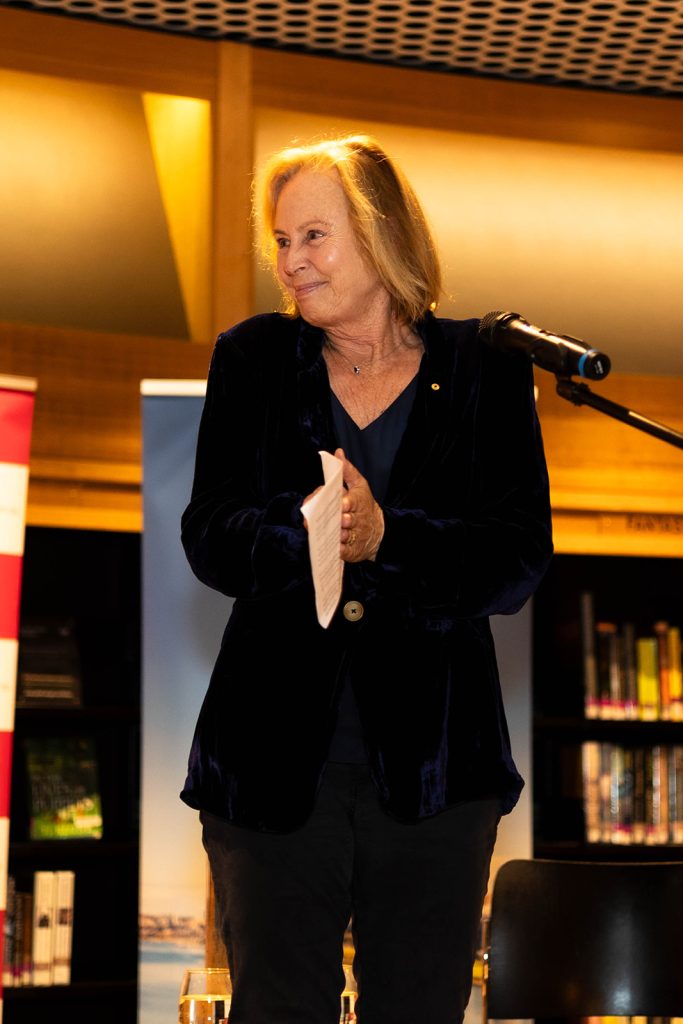
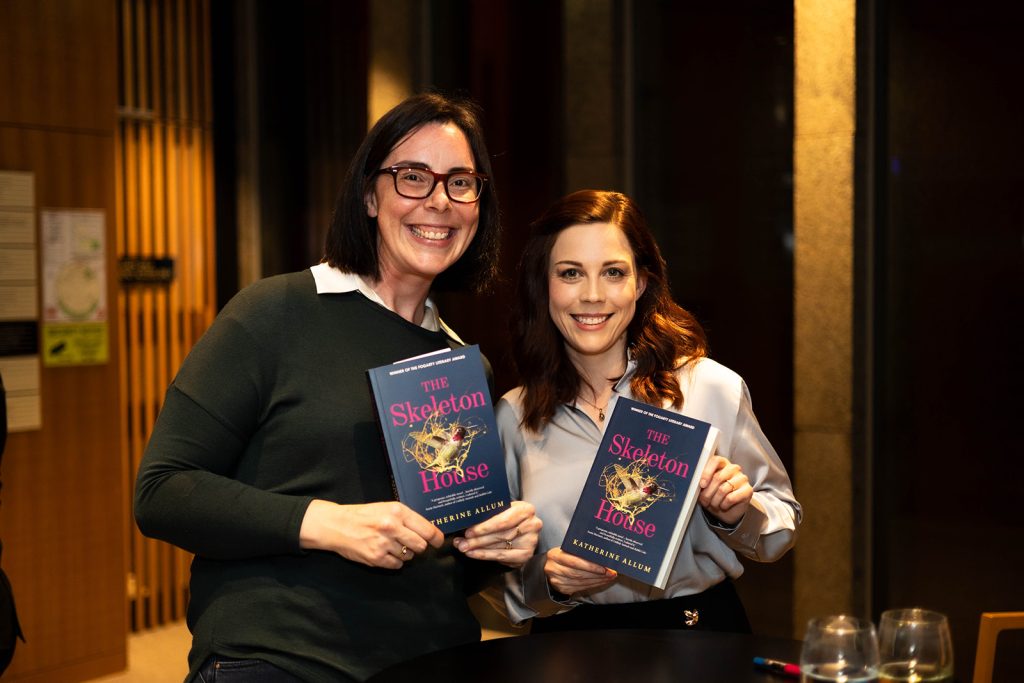
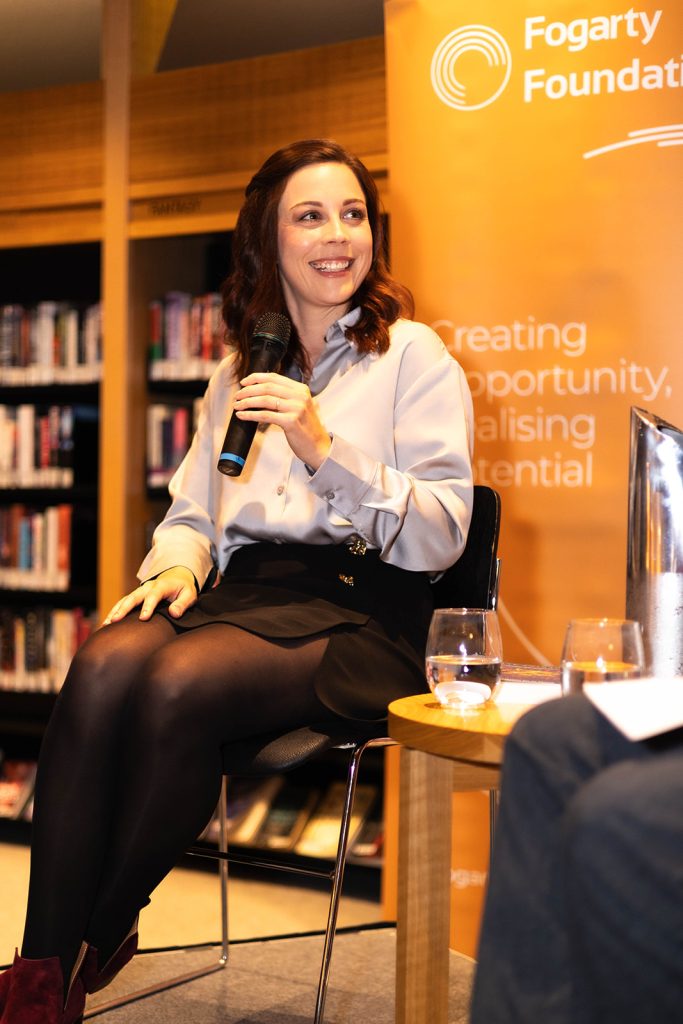
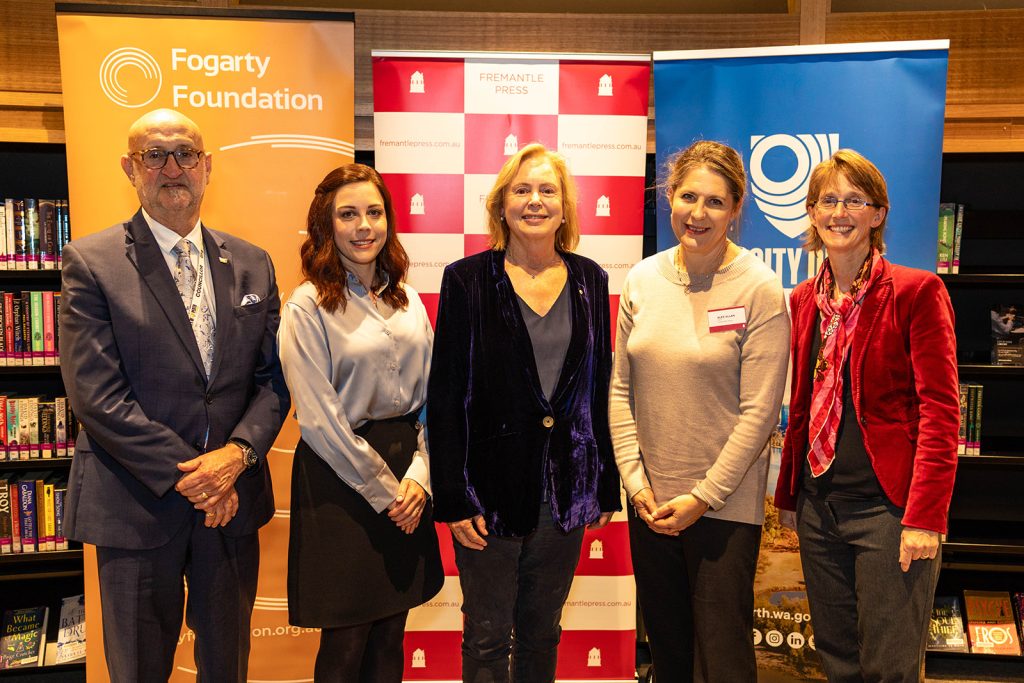
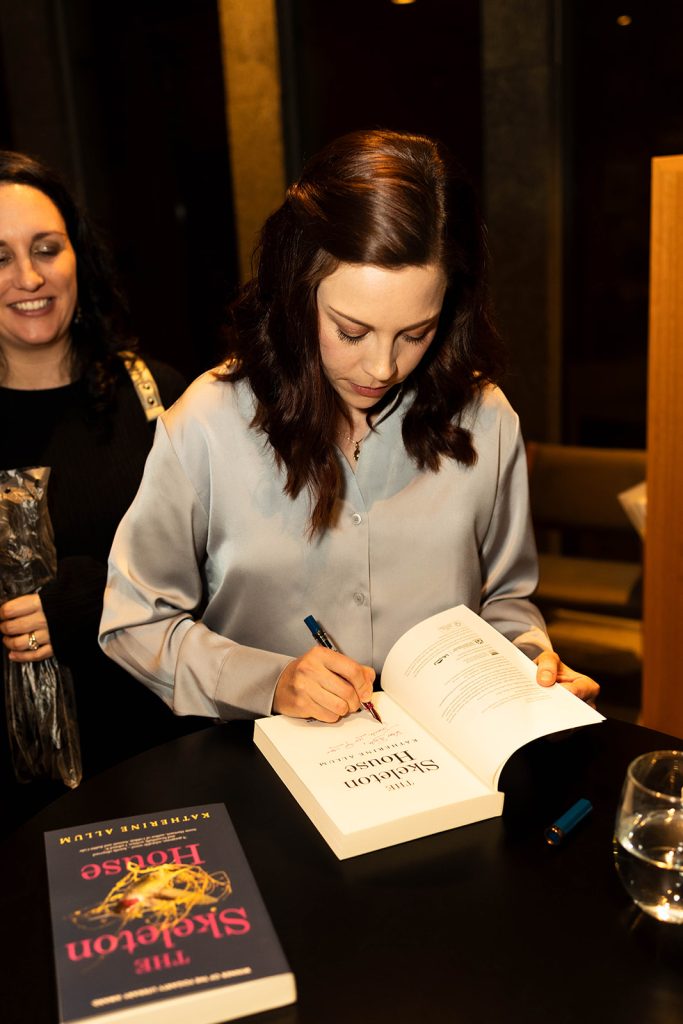
For the first In Conversation of the year, the UWA Fogarty Scholars participated in a unique experience during this year’s leadership series, titled “Leadership in Conversation: Court is in Session.” The formal courtroom setting provided an immersive backdrop for the Scholars to engage with esteemed legal professionals and explore the nuances of leadership within the law’s context.
The choice of a courtroom as the venue for this year’s leadership series was intentional, creating an environment that fostered intellectual curiosity, critical thinking, and an appreciation of the complexities of leadership within the legal sector. The halls of justice became a classroom, and our Scholars had the opportunity to witness firsthand the intersection of law and leadership.
The event featured a panel of legal professionals sharing insights on leadership, overcoming challenges and the positives from working in the field. Judge Laurie Levy SC has served as a Judge since 2014, holding additional roles in the Children’s Court and the Supreme Court and more recently, as an educator to other judges. Thomas Coltrona, a 2014 UWA Fogarty Scholar, is an Associate at Bennett – Litigation and Commercial Law, also holding voluntary executive positions within legal organisations bodies. Adehlia Ebert, a 2015 UWA Fogarty Scholar, is a Law Graduate at the State Solicitor’s Office, with prior experience as a Judge’s Associate, who has also won a place as a Judge’s Associate at the High Court of Australia for 2025. Through engaging conversations, the Scholars gained insights into the challenges and responsibilities that come with leading in a domain where decisions have far-reaching consequences.
Judge Levy succinctly encapsulated the essence of the panel discussion, noting that “What you see in the courtroom is real life,” highlighting the legal profession’s role within the community to aid those in need. This sentiment underscores the importance of recognising the genuine challenges and responsibilities within the profession. Ebert echoed this sentiment, expressing concern over modern – often negative – portrayals of lawyers, emphasising the commitment of legal professionals to the pursuit of justice above all else. When asked about the primary challenges confronting the legal sector, Judge Levy highlighted the emergence of AI as a significant concern. He noted that although AI is increasingly prevalent, it remains unreliable. Coltrona also emphasised the ethical dimensions surrounding the use – and potential misuse – of AI. He underscored the responsibility of the legal profession to confront ethical dilemmas and uphold legal standards; both in the past and with the emergence of these new tools. Furthermore, Coltrona noted the move by many of the larger firms to develop their own AI tools, due to the significant reduction in research-based and other workload they enable, thus leveraging potentially significant efficiency gains.
The panel discussion was followed by a Q&A session that provided Scholars with an opportunity to engage and seek advice from the attending professionals. Scholars were encouraged to pose insightful questions, delving into topics ranging from establishing themselves within the legal field to advice on achieving work life balance – and maintaining one’s wellbeing – in what can be a demanding career. Ebert shared her positive encounters with senior colleagues and recommended reaching out to them as a means to foster personal growth and confidence. This was reinforced by Judge Levy who said that part of the role of Senior Counsel is to provide advice and support to more junior lawyers, together with organisations such as WA based not for profit, the Piddington Society.
The UWA Fogarty Scholars’ leadership series is designed to extend learning beyond a traditional setting. As the Scholars continue their academic journey, the lessons learned from these opportunities help to shape their perspectives on leadership and contribute to their future success in their various fields.
